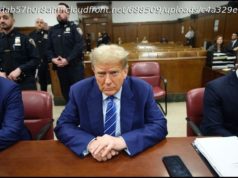The jury sent four questions to the judge.
The jury in Paul Manafort’s trial hasn’t made up its mind just yet. Deliberations began Thursday morning, and jurors discussed the case behind closed doors all day, but didn’t reach a conclusion.
Instead, jurors ended the day by sending Judge T. S. Ellis four questions — one of which asked him to define the meaning of “reasonable doubt” again.
The implications are unclear. The case is complex: Special counsel Robert Mueller’s team has charged Manafort with four different types of offenses, and 18 counts in total. Prosecutors submitted hundreds of exhibits of evidence for the jury to review. And jurors’ verdict on each count must be unanimous: guilty or not guilty. (If the jury ultimately fails to reach a unanimous verdict for certain counts, a mistrial will be declared for those counts.)
The jury could simply be carefully taking its time, reviewing evidence, and making sure they’ve considered the defense’s strongest arguments. Or there could be disagreements on certain counts. Or one or more jurors could be predisposed toward Manafort’s innocence overall, which is surely what the defense is hoping for. We simply don’t know.
At the end of the day, though, the judge answered only two of the jury’s four questions.
The FBAR question: One question was about a set of charges related to Manafort’s offshore accounts that contained tens of millions of dollars — prosecutors charged him with four counts of failing to fill out a legally required form known as an FBAR (Report of Foreign Bank and Financial Accounts), to disclose his foreign holdings to the US government.
Now, Manafort’s holdings were structured in a complex way, and the defense argued that should have exempted him from having to fill out FBAR forms. Yet prosecutors argued that the accounts were truly set up and run on Manafort’s behalf.
So the jurors asked whether someone (Manafort) would in fact have to fill out the FBAR if he owned less than 50 percent of a company and had no signatory authority over it.
Judge Ellis answered this question, telling the jury that if a person controlled “the disposition of money” from the account, or if the listed owner of the account was acting as an agent for that person, the person (Manafort, in this case) would indeed be legally required to fill out an FBAR, according to the Washington Post’s Rachel Weiner .
The shelf company question: Many of Manafort’s complex offshore holdings were structured as “shelf companies” — companies with no apparent activity — in Cyprus. They’re called that because they’re “ on the shelf,” and have not yet been used.
The jury asked for the definition of a shelf company. But Ellis would not answer, and said they had to rely on “collective recollection,” per NBC.
The reasonable doubt question: Jurors also asked Judge Ellis to define the concept of “reasonable doubt” again for them. (In their closing argument, Manafort’s lawyers stressed that the government had to prove his guilt beyond a reasonable doubt — positioning it as a very high and difficult standard to meet.)
According to Zoe Tillman of BuzzFeed News, Ellis answered this question by telling jurors that prosecutors don’t have to prove their case beyond “all possible doubt,” but instead beyond doubt that is based on reason.
The exhibit list question: The government has submitted hundreds of exhibits of evidence over the course of the trial that jurors can now review. But it’s a long, complicated list.
So jurors asked whether they could get a list of which particular pieces of evidence are said to match up with each of the 18 separate charges against Manafort. Ellis, however, said no.
The jury will reconvene to continue their deliberations Friday.






